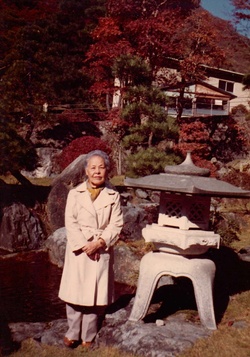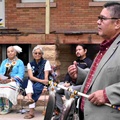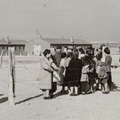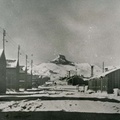One of the things I have finally learned is that there are late people and early people. There are late families and early families. And there are late generations and early generations.
I come from an early family. My parents would habitually show up everywhere half-an-hour early. I learned early on that if we were going to pick someone up at the airport, for example, there was going to be at least a 30-minute wait if the plane was on time. Going to a baseball game meant getting there before everyone else, watching batting practice, then getting a hot dog, buying my souvenirs, and getting uncomfortable in my seat all before the game actually started.
Family get-togethers were more of the same. First of all, as an early family, these holiday celebrations always took place over lunch, not dinner, the better to get there early and get home early. Everyone always arrived well before the announced time—all except for one family who were usually “late”—meaning they arrived at the announced time.
For years, I thought that everyone was like this. My first hint that something was not quite right was when I became old enough to go places on my own, to hang out with my own friends. I remember one high school era party set for 7:30 at someone’s house. Like I had been trained, I arrived at a little after 7:00 (bringing something, of course, but that’s a cultural peculiarity for another time). Naturally, the host was in curlers, polite, but clearly peeved. I sat by myself on the couch for another hour or so before people began to arrive. “How rude,” I thought. After this happened a few more times, the truth began to dawn on me.
I also learned at about this time, that it wasn’t really my parents’ fault. My maternal grandmother lived with us on and off throughout my growing up years. As I emerged from my teenage hate-all-adult-family-members phase, I began to really enjoy my grandmother’s company, even though we could hardly communicate. A great shopping enthusiast well into her 80s (another characteristic passed down to me) but one with limited mobility in LA’s public transportation void, she would always appreciate a lift to the store. Being the dutiful grandson, I would offer to take her periodically. I would tell her the night before, “Okay, Grandma. Since the store opens at nine, we’ll leave the house at about ten to nine to get there right when it opens.” She would agree, and it would appear we were all set.
The next morning, I would straggle out of bed at eight, figuring I would follow my usual routine of eating a bowl of cereal and reading the paper before getting washed up and dressed and going to the store. As I staggered to the kitchen, I would glance into the living room—to see my grandmother fully dressed, sitting by the door with her purse in her lap, staring plaintively out the window. I would double-check the clock—8:05.
“We did say—ten to nine, right?” I would ask her. She would nod and say, “I just wanted to be ready in case.” Feeling extremely guilty for keeping her waiting, I would rush through my morning routine and we’d be out the door by 8:30. I could swear I would see a smile on her face as we arrived at the store at 8:45, to wait in the car until they opened.
Certainly there was a method to this apparent madness. As near as I can figure out, the thinking goes something like this. First, figure out what the worst possible scenario is for the task at hand. When going to someone’s house for dinner, for example, this might mean allowing for heavy traffic, Marie Callendar’s being out of fresh peach pie, and a major earthquake. Once a worst case scenario is arrived at, you leave early enough to get there at the scheduled time despite this. If none of this happens, no big deal, you’re just a little early. Unlike any of my friends, I’ve never missed the beginning of a concert or sporting event, never missed an airplane (okay, once, but it wasn’t my fault), and rarely have been the one to keep a group waiting.
By contrast, my wife and her family (well, her mother’s side any way) are mostly late people. If you’re getting picked up at the airport by them, be prepared to wait. If you’re going to a ballgame together, you better hope that nothing happens in the first couple of innings. Family get togethers are dinners, where people straggle in at all hours, regardless of the announced time.
Certainly there are advantages to this style as well. Some people just don’t relate well to the clock and are able to function much more smoothly without having to look at one. If you live as busy a life as my wife, one less thing to worry about is no small thing. If you’re always late, you also won’t have to wait for others very often. There is also the line of thinking, often true among my circle of friends, that since everyone else is going to be late, it’s better to take that into account when figuring out when to arrive someplace.
Among late people, there seems to be an unwritten understanding that time is not such a big deal. My wife will plan things with her friends for a certain time. If someone is two hours late, no big deal; the others just hang out and when that person gets there, they figure out what they want to do. Often it will be too late to do much of anything by that time. To me, this is a wasted evening; to her and her late friends, it’s a good time.
Naturally, troubles have arisen between my early family and her late one. We now know that when planning something involving a mixture of early and late people, that we have to tell different people to show up at different times to insure they get there at something approximating the same time.
As time has gone on, I have become more of a late person. In conflicts between the early and the late, it always seems to be easier for the early person to adjust to being late than the other way around. While my wife has made some improvement in her lateness, I have more or less conceded and adjusted to being a later person.
I think there is a generational component to being early and late as well. Most Nisei seem to be early people; most Sansei and Yonsei seem to be late people, so my adjustment also puts me in line with most of my peers. (Relative to most of them, I’m still an early person. It is one of the reasons many of them accuse me of being like a Nisei, a most scurrilous charge indeed.) As a relatively early Sansei—and one who deals with a lot of Nisei on the job—I’ve had the opportunity to observe much early-Nisei behavior.
When scheduling meetings involving groups of Nisei, for example, it is important to be prepared for some to arrive long before the scheduled time. Depending on where people are coming from, it isn’t unusual for people to arrive an hour early on occasion. Recently, I arrived at work at 8:30 only to see my 10:00 appointment waiting for me! And she had already been waiting for nearly an hour!
My favorite early-Nisei episode took place when my wife and I decided to stop by a South Bay Japanese market while we were down there one morning. We pulled into the nearly full parking lot, got out of our car, and walked up to the store, only to realize that the store wasn’t going to be open for another ten minutes. We then turned to see an entire parking lot filled with late model cars in which Nisei couples sat staring straight ahead, not saying a word to each other. It was like a scene from one of those alien body snatching movies. Did we stumble across evidence that our parents had been replaced by zombie-like creatures who hibernated in cars outside closed Japanese markets? Just to be sure, we scurried back to our car, sat down, and began to stare straight ahead, trying to keep our lips from moving as we commented on the strange scene.
Ten minutes later (seven actually, since the store, of course, opened a few minutes early), the doors opened and everyone made their way to the store. Once inside, everything was normal again. Clearly, these were regular Nisei; no space aliens here. We felt as if we had witnessed a special ritual we weren’t meant to see, something we will remember for the rest of our lives.
I’ve often argued that Nisei and Sansei are more alike than different, that much of the difference between us has to do with the different life stages we’re at than it does with different values or customs. Most Sansei are in that time intensive, child rearing, career building years, while most Nisei are in or near retirement. Could it be that as we get to retirement age, we’ll become early people too, destined to sit in parked cars in front of closed Japanese markets?
I could see myself doing this, actually, if only to antagonize my grandchildren. As for my wife and most of our peers, I suspect that they’ll still be in bed, glad that this one part of the culture hasn’t been passed down.
* This article was originally written for his “Spoiled Sansei” column that ran in The Rafu Shimpo in May 1995 and republished in the Nanka Nikkei Voices: The Japanese American Family (Volume IV) in 2010. It may not be reprinted or copied or quoted without permission from Japanese American Historical Society of Southern California.
© 1995 Brian Niiya







